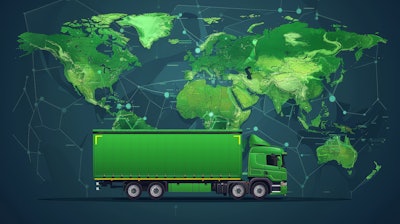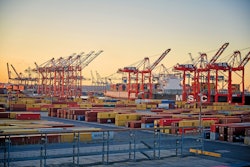
Global trade relies heavily on logistics and transportation to move goods and resources efficiently. However, this vital industry significantly contributes to greenhouse gas (GHG) emissions, raising concerns for long-term sustainability. With growing awareness of climate challenges and increasing pressure to reduce carbon footprints, businesses are exploring solutions to balance efficiency with environmental responsibility.
Sustainable fleet management has emerged as a critical approach, offering organizations a pathway to enhance their operational efficiency while addressing environmental concerns. By integrating green practices into logistics, companies can align their operations with global sustainability goals and contribute to a more resilient future.
The environmental challenges of traditional fleet operations
To truly understand the potential of sustainable fleet management, it is essential to first address the pressing environmental challenges posed by traditional fleet operations. The logistics sector accounts for 24% of global CO2 emissions, with freight transportation being a substantial contributor. Heavy-duty vehicles alone are responsible for almost half of transport-related emissions, according to the International Energy Agency.
Traditional fleet operations rely on fossil fuels, outdated vehicle models, and inefficient management practices, which not only harm the environment but also takes a toll on the financials. For instance, unoptimized and unmapped routes coupled with poor maintenance practices lead to excessive fuel consumption, while older vehicles produce higher emissions. Addressing these inefficiencies requires a systemic overhaul that incorporates sustainable practices and technological capabilities to reduce the environmental footprint of fleets.
Transformative role of technology in sustainable fleet management
Overhauling traditional practices requires the integration of advanced technologies that enable businesses to embrace sustainability without compromising operational efficiency. Advancements in technology have unlocked immense potential for businesses to transition toward sustainable fleet management. These innovations allow organizations to reduce emissions, improve fuel efficiency, and streamline operations like never before.
Let’s look at some of the key technologies transforming fleet management today:
- Electric vehicles (EVs). EVs are redefining fleet operations with their zero tailpipe emissions and lower operating costs. They are quickly becoming the backbone of sustainable fleets, as industry trends project EV dominance in the coming decades.
- IoT-enabled telematics systems. These systems empower fleet managers to monitor vehicle performance and fuel usage in real-time. The insights enable businesses to make strategic decisions that align with their core objective as well as sustainability goals.
- AI-powered route optimization. Artificial intelligence optimizes delivery routes by analyzing factors like traffic, weather, and schedules, ensuring that every mile is efficient and contributes to a better future for both businesses and the planet.
- Cleaner fuels. Alternatives like biodiesel, compressed natural gas (CNG), and hydrogen fuel cells are gaining momentum in today’s modern age and provide fleets with additional flexibility to meet environmental goals.
Key benefits of sustainable fleet management
By adopting these transformative technologies, businesses can unlock significant financial and operational benefits while making meaningful contributions to environmental preservation. Sustainable fleet management enables organizations to significantly reduce fuel and maintenance costs, providing both economic and environmental advantages.
Additionally, compliance with increasingly stringent emissions regulations helps companies avoid penalties while unlocking access to valuable tax incentives and subsidies. These regulatory alignments not only reduce costs but also position businesses as proactive participants in global sustainability efforts.
Beyond cost and regulatory benefits, sustainability initiatives play a vital role in enhancing corporate reputation. Businesses that prioritize green practices foster stronger brand loyalty and are increasingly viewed as socially responsible leaders by consumers and stakeholders alike.
Moreover, sustainable practices contribute to broader societal benefits, including cleaner air, reduced resource depletion, and a healthier planet. By aligning business goals with global environmental priorities, organizations can drive meaningful change while securing long-term success.
Challenges in implementing sustainable fleet management
Despite the compelling benefits, the transition to sustainable fleet management presents several challenges that must be addressed to ensure successful implementation. One of the most significant hurdles is the high initial investment needed for EVs, advanced telematics systems, and charging infrastructure. These costs can be prohibitive for many businesses, particularly smaller organizations. However, government incentives and financial support programs play a crucial role in offsetting these expenses, making the transition more accessible.
Another major challenge is the limitation of infrastructure, such as the insufficient availability of EV charging networks and alternative fuel supply chains. These gaps hinder the scalability of sustainable fleet practices, particularly in regions with less-developed infrastructure. Addressing this issue requires a concerted effort from both public and private sectors to build robust, widespread networks that can support the increasing adoption of green technologies.
Additionally, policy disparities across different regions create complications for multinational companies striving for consistency in their operations. Variations in regulations, subsidies, and compliance requirements can slow down the pace of adoption and increase operational complexity. Harmonizing policies across regions is essential to creating a supportive environment that accelerates the implementation of sustainable fleet management globally.
Understanding and tackling these challenges is critical for businesses looking to make meaningful progress in their sustainability goals while ensuring operational efficiency and long-term success.
Future outlook for sustainable fleet management
The path forward for fleet management is unmistakably tied to sustainability. Governments are introducing ambitious climate programs, such as the EU’s ‘Fit for 55’ initiative, to enforce stricter emissions regulations and promote the adoption of green practices.
Technological advancements are also accelerating progress. For instance, improvements in battery technology are making EVs more affordable and efficient, while innovations like blockchain and autonomous electric vehicles are poised to revolutionize logistics. Blockchain, in particular, offers enhanced supply chain transparency, enabling companies to monitor emissions and optimize operations with precision.
As these advancements continue, companies investing in sustainable practices today will not only gain a competitive edge but also contribute to a resilient and sustainable global economy.
Path forward
Sustainable fleet management represents a transformational opportunity for businesses to align profitability with environmental stewardship. By adopting advanced technologies like electric vehicles, Internet of Things (IoT)-based telematics, and artificial intelligence (AI)-driven tools, organizations can significantly reduce emissions and improve operational efficiency.
While challenges such as infrastructure gaps and high initial costs persist, the long-term benefits far outweigh these obstacles. Companies that prioritize sustainable fleet practices today will be well-positioned to navigate future challenges and lead the industry toward a greener, more sustainable future.
The logistics sector is at a critical crossroads. Embracing sustainable fleet management is not just a necessity—it’s an opportunity to shape the future of global trade and contribute to a healthier planet.


















